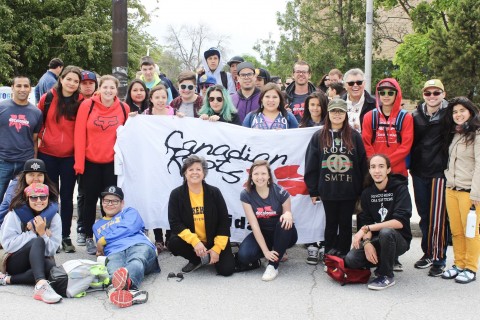 Canadian Roots Exchange recently announced that they will be hosting their seventh National Youth Gathering in Saskatoon from Nov. 15-17. The event will offer participants three days of speeches and youth-led workshops with the goal of bringing youth into talks of reconciliation.
Canadian Roots Exchange recently announced that they will be hosting their seventh National Youth Gathering in Saskatoon from Nov. 15-17. The event will offer participants three days of speeches and youth-led workshops with the goal of bringing youth into talks of reconciliation.
Since its creation in 2008, CRE’s objective has been to strengthen the relationships between Indigenous and non-Indigenous peoples in Canada. The National Youth Gathering aims to achieve this by giving anyone from age 15 to 29 the chance to learn, listen, share experiences and take part in group activities. General registration closes on Oct. 15, and applications to speak at the gathering close on Oct. 4.
The upcoming National Youth Gathering aims to welcome a diversity of youth, both Indigenous and not. Max FineDay, executive director of the CRE and former University of Saskatchewan Students’ Union president, encourages U of S students to attend the gathering, regardless of their level of understanding on reconciliation, for the opportunity to learn something new.
“This isn’t just for the department of [Indigenous] studies. This isn’t just for the department of history,” FineDay said. “There are ways for reconciliation to tie into every curriculum, every college, [and] every class that this university has to offer. It’s up to our generation to ask the institution, to ask our professors, to make sure it is.”
FineDay believes that youth play a valuable role in the gathering’s theme of miyo-wîcêhtowin, which strives for a future of respectful relationships. He states that youth today have first-hand experience of how the relationships between Indigenous and non-Indigenous peoples have changed throughout generations, and therefore, play an important part in reconciliation narratives.
“We are the first generation — now, today — to have treaties implemented as a part of the curriculum in schools. That’s something our parents didn’t have — that’s something our grandparents didn’t have,” FineDay said. “We are the first ones to be able to learn about residential schools in our classrooms and recognize that Canada has some dark spots in our history.”
In addition to attending the gathering, youth also have the chance to speak at it. Anyone under 29 who wishes to share their experiences is able to apply. After submitting an application, it will be examined by adjudication to make sure the application fits the gathering’s theme and intent.
FineDay says the three-day event will be an opportunity for networking as well as for learning. Although reconciliation is a difficult topic for many, FineDay hopes that the gathering can be a positive place to connect and move forward.
“My dad is a residential school survivor, and he’s spent many many years trying to be able to provide a good life for me, and for my siblings, and making sure that we’re not burdened by what happened to him,” FineDay said. “What I hope for this country — what I hope for young people … is that we learn from it. I can be over it while still recognizing that it didn’t happen so long ago.”
For FineDay, Canadian youth are the demographic that is able to enact change and engage with Canada’s movement toward reconciliation.
“I think it’s important for us young people to lead the way and show our parents that this work actually can be done,” FineDay said. “It can be done in a good way, and our generation can actually lead it.”
—
Sophia Lagimodiere
Photos: Supplied / Max FineDay
Leave a Reply